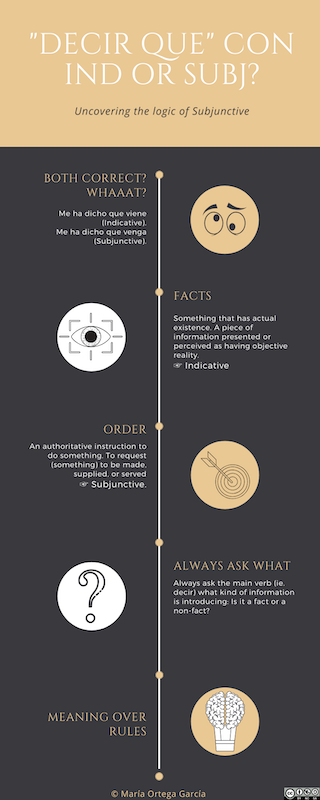I have two sentences for you:
Me ha dicho que viene el jueves.
Me ha dicho que venga el jueves.
Both correct.
How is that possible?!?! What is this madness!?
It’s not senseless and it is consistent with the meaning of subjunctive (subjective). Keep reading.
One could say that some of the uses of the Subjunctive are exceptions and don’t make any sense and you just need to learn it by heart, but the truth is that all the uses of Subjunctive are pretty consistent with its logic (and the sentences above are an example of it) and who tells you otherwise is because they don’t really get the logic behind subjunctive.
Let’s focus on the two sentences at the beginning of this article. Both sentences are introduced by the same verb “ha dicho”, both followed by “que” and one with Indicative (the first) and the other one with Subjunctive (the second).
At the core of the Subjunctive’s raison d’être (razón de ser) we have that Subjunctive exists to talk about all the things that are not facts. It is subjective to the speaker’s opinion, desire, will…
First of all, we need to understand what is a fact. The dictionary presents us with two meanings:
1. a. something that has actual existence
b: an actual occurrence
2. a piece of information presented or perceived (I added this last bit as it is relevant for the use of Subjunctive) as having objective reality
On the contrary, by “non-fact” we have everything else (!). A non-fact is everything that is not a fact, and in this category, then, we have many things, from opinions to wants, passing through things that haven’t happened yer (therefore don’t exist yet), advice, goals or characteristics of things we don’t know exist, amongst other situations.
First Filter: Look at the introductory verb
We normally can decide whether we use indicativo or subjuntivo according to the introductory verb’s meaning.
So, if the verb introduces a fact, we use indicative
- Sé que vienes – I know that you come
- Me informaron de que Juan ha abandonado el trabajo. – I was informed that Juan left the job
And if the verb or expression introduces a non-fact, then, we use subjunctive
- Me encanta que llegue el verano – I love that summer arrives
- Te recomiendo que visites Bali – I recommend you to visit Bali
One could argue that “decir” – to say, introduces information that is a fact, so we should use indicativo every time, right?
Not always.
Second Filter: Ask about the intention of the speaker
If the first filter to discriminate if you need indicativo or subjuntivo is to look at the introductory’s verb meaning. The second filter is the intention of the verb / sentence introduced.
Let’s focus on “decir que”. Decir que reports a piece of information that someone else said. So one has to go back to that piece of information, to the actual words of a speaker.
In “Dijo que viene el jueves” we find this:
A to B
A: Vengo el jueves – (Piece of information / Fact)
A while later, B to C
B: A ha dicho que viene el jueves
Now, in “dijo que venga el jueves”
A to B
A: Ven el jueves – (order, demand / Non-fact)
Later, B to C
B: Me ha dicho que venga el jueves
See the difference now?
The intention of the sentence reported is different. With the sentence in Indicative we communicate a fact or something perceived as a fact, in the second, with Subjunctive, we communicate an order.
An order is not a fact.
Order
1. give an authoritative instruction to do something.
2. request (something) to be made, supplied or served.
In an order, the speaker/subject always expresses an influence over someone else. Besides, the thing the speaker wants is not real yet (that’s why they want it), or it may never be.
In the first one, the speaker gives a piece of information that is considered to be true. In the second, the speaker communicates their will of someone else.
Conclusion: The logic of Subjunctive
Subjunctive follows a logic. Subjunctive exists in the language to fulfil the need of communicating everything that is a non-fact. So, you either memorise rules of use, or you understand the meaning of the information conveyed to understand the logic of Subjunctive.
In the examples explored in this post, we saw clearly that despite the apparent objectivity linked to verb “decir”, it can communicate not only objective facts, but also orders, desires…. , that is, non-fact information. Meaning always trumps rules.



